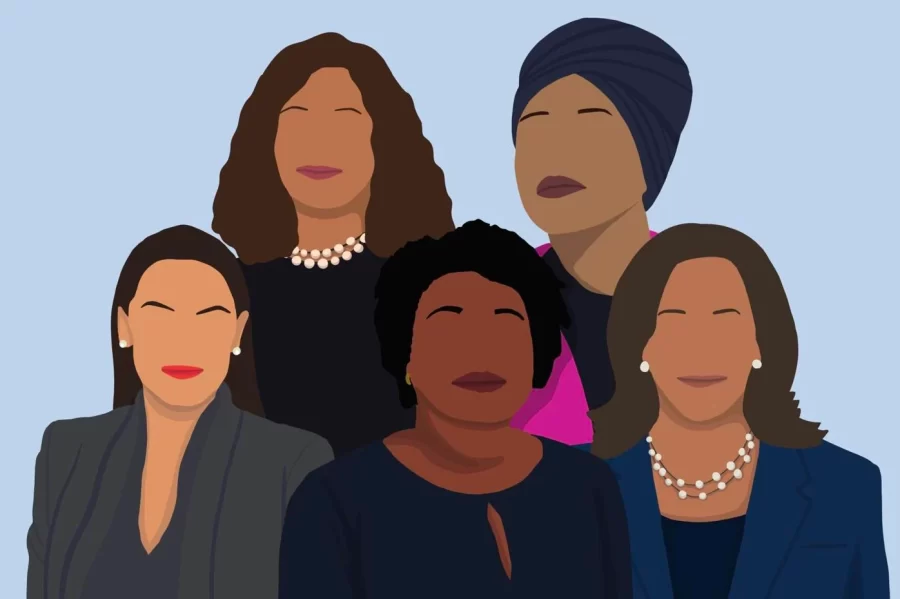WHM: Women in Politics
In the United States and across the world, the greatest and most evident gender disparities have been in politics. It is not a coincidence that 6 U.S Presidents have been named James, 5 John, and 3 George. It is statistically more likely for a man with one of these names to hold the presidency than any woman. Only 24% of U.S senators are women, and 21% of them are white. The United States in particular has had difficulty electing women and women of color. This piece will feature a few leaders from across the globe who have inspired and continue to inspire our communities to promote social change and weave a narrative led by women.

Kamala Harris:
Kamala Harris has a career of firsts. In 2021 she became the first woman, African American, and Asian American vice president of the United States, becoming the highest-ranking female official in U.S. history.
Harris is the definition of intersectionality and experience in politics. Prior to winning the vice presidency in 2020 on the Biden-Harris ticket, she served as the District Attorney of San Francisco, the Attorney General of California, and as a U.S. Senator from California. In these positions, Harris created opportunities for first-time drug offenders to earn a high school degree and gain assistance in finding employment in California. Although she wasn’t the most policy-oriented legislator, Harris was known for her questioning of witnesses in the Senate chambers, a factor she’d present again when she faced Vice President Pence on the debate stage where ultimately her prosecutorial skills served her well. She has been guided by and ran her 2020 presidential campaign on peopleship, often repeating her mother’s words, “Kamala, you may be the first to do many things, but make sure you are not the last”. Harris continues to work to ensure that her career, although one of many firsts, is not one of the lasts.

Teresa Leger Fernandez:
Teresa Leger Fernandez is new to the political world, taking office in 2021 to serve as the U.S. House Representative for New Mexico’s 3rd Congressional District, which covers the northern part of the state that includes tribal land. She made history in 2020 when she was elected along with Deb Haaland* and Yvette Herrell, making New Mexico the first state to elect all women of color to its house delegation.
Leger Fernandez has had a successful law and activism career fighting for New Mexican communities, especially rural, Native American, and Latine communities, like in her hometown of Las Vegas. “To represent my district you need to know not only its beauty but also its poverty and promise.” Leger Fernandez now sits on the Natural Resources, Education and Labor, and House Administration committees, where she has advocated for the Emergency Rental Assistance Program (ERAP), new climate policies, and the expansion of infrastructure to rural New Mexico. Leger Fernandez continues to work for her community and honor her Latine heritage, telling us “Ahora es Cuando” to make a change in our communities.
*Melanie Stansbury was elected after Deb Haaland assumed the position of Interior Secretary, she is the first Native American to hold this office.

Julia Gillard:
Julia Gillard is the former Prime Minister of Australia and leader of the Australian Labor Party. She is the first and only woman to hold this position in Australian history. She now serves as the inaugural chair of the Global Institute for Women’s issues where she delves into the topics of electability and the perceptions of women as leaders.
In 2010, it seemed that Gillard had smashed the ultimate glass ceiling, but during the next 3 years of her term, she faced constant sexism and misogyny from the press and the opposition party forcing her to eventually retire from politics. She is an interesting corollary to Hillary Clinton in the U.S. who underwent similar discrimination and vitriol and whose “Deal Me In” speech can be taken under the same lens as Gillard’s misogyny speech. Her impromptu misogyny speech gained international recognition as she called out the double standards facing women in politics and the perception of herself as a leader famously saying, “I will not be lectured about sexism and misogyny by this man”, referencing Tony Abbott the leader of the opposition party. Gillard’s political career has been self-described as fitting into the glass cliff theory, which is a phenomenon of women being more likely to assume leadership roles in a time of downturn or crisis making failure more likely and costly not just for the woman, but all women. Gillard entered office in a time of political instability for her party which created great divisions and resulted in a sexist backlash toward her leadership. Despite the challenge of working in a minority government and the misogynistic vitriol, Gillard was successful in passing legislation including major education funding and paid parental leave. Gillard’s success in enacting policy and reshaping how we address these issues, by inspiring more women to call out sexism and misogyny instead of being silenced and scolded for playing the “gender card”, is how we as a society will progress in normalizing women in leadership positions.
—
The very act of being a woman has been conflated with our idea of electability and resulted in electoral failure. This has established a double standard for women, creating an insurmountable amount of pressure for women in these positions.
Author’s Note: All the women on this list have held elected office, so there are numerous activists and federal justices that could have been listed.
